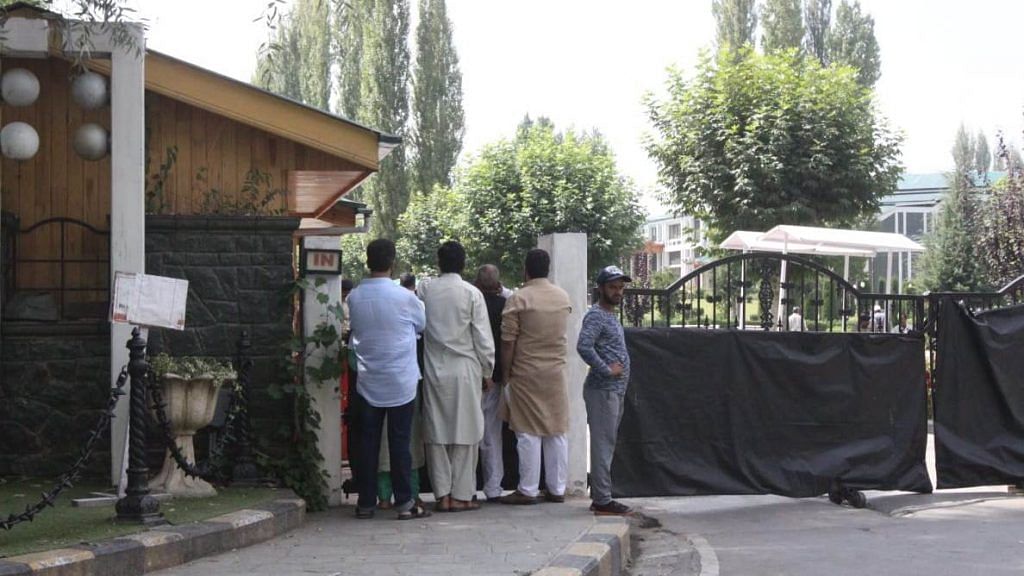Srinagar: The Jammu and Kashmir administration has started shifting political leaders from detention centres to their homes in the Valley, ThePrint has learnt.
So far, four leaders have been shifted but they will remain under house arrest, a source in the administration said. The release of two more leaders is under process, the source said.
The four leaders who have been shifted are Hurriyat chief Mirwaiz Umar Farooq, National Conference (NC) leader Ghulam Ahmad Sofi, Peoples Democratic Party (PDP) leader Muzaffar Baig and CPI(M)’s Mohammad Yousuf Tarigami.
“While Sofi was released 10 days ago, on health grounds, Farooq was released as he was keeping unwell and a home environment would be more comfortable for him to stay in. Tarigami too was unwell and was released two weeks ago,” the source said.
“The aim is to restore normalcy but slowly. We have started shifting the detainees back home, which means the situation is getting better,” said an official of the administration.
Detention reviewed every week
According to the official, currently, there are four designated detention centres — one at Hari Niwas, where former chief minister and NC vice-president Omar Abdullah has been detained, the JKTDC huts in Chashme Shahi where another former CM and PDP chief Mehbooba Mufti has been lodged, the Centaur Hotel and the Sher-i-Kashmir International Conference Centre (SKICC), which houses over 50 former MLAs, councillors and political party workers.
Apart from political leaders, more than a dozen over-ground workers as well as alleged stone pelters have been arrested on a crackdown drive run across Srinagar. The detention is reviewed every week.
According to a second source, the decision to release or further detain a political person depends on their past record, their behaviour in custody and how capable they are of influencing the public in a “negative” way.
This source said a district magistrate conducts hearings inside the detention centres every week, where the detainees are heard.
“Their statements are recorded and their file is reviewed. Inputs from the agencies are also taken into consideration before a final report is prepared and a decision to extend or terminate their custody is taken,” the second source said.
“Once it is decided that the custody will be extended, a notice of further custody is served to them. We maintain records in such details that files of all these individuals have become extremely bulky,” the source added.
“They are under preventive detention, which is essential to maintain law and order in the Valley. We cannot afford any political leader giving a call for people to congregate and create a law and order problem.”
Also read: In Kashmir shops are closed and all is silent, but it’s far from peaceful
Relatives queue up outside SKICC
Relatives of the detainees have formed queues outside the SKICC, urging security officials to let them meet. But their requests are denied, and they are sent back.
“Hilal Ahmad Shah, chairman of the Anantnag municipal corporation, has been detained. He is an elected leader. Why has he been kept inside for the past 25 days? We come here every day to meet him, but they shoo us away,” said a relative who did not wish to be identified.
Another man waiting to meet his former MLA father said: “What this government is doing by jailing elected leaders is further alienating us Kashmiris. How will we ever trust them? What democracy is this?
“They announced the abrogation of Article 370 without any dialogue, arrested all leaders and crushed our voices. We cannot go inside and meet our relatives, how will we ever trust them?”
Administration officials, however, denied these claims, saying they have been arranging meetings with relatives on a regular basis.
“It will be wrong to say that they are not being allowed to meet their relatives. We have kept Wednesday and Thursday for these visits and the relatives can even go and eat with their dear ones inside. The political detainees have been kept under good conditions,” said an official on the condition of anonymity.
Also read: After chest-thumping over Article 370, polarised Jammu waits for end to ‘discrimination’
